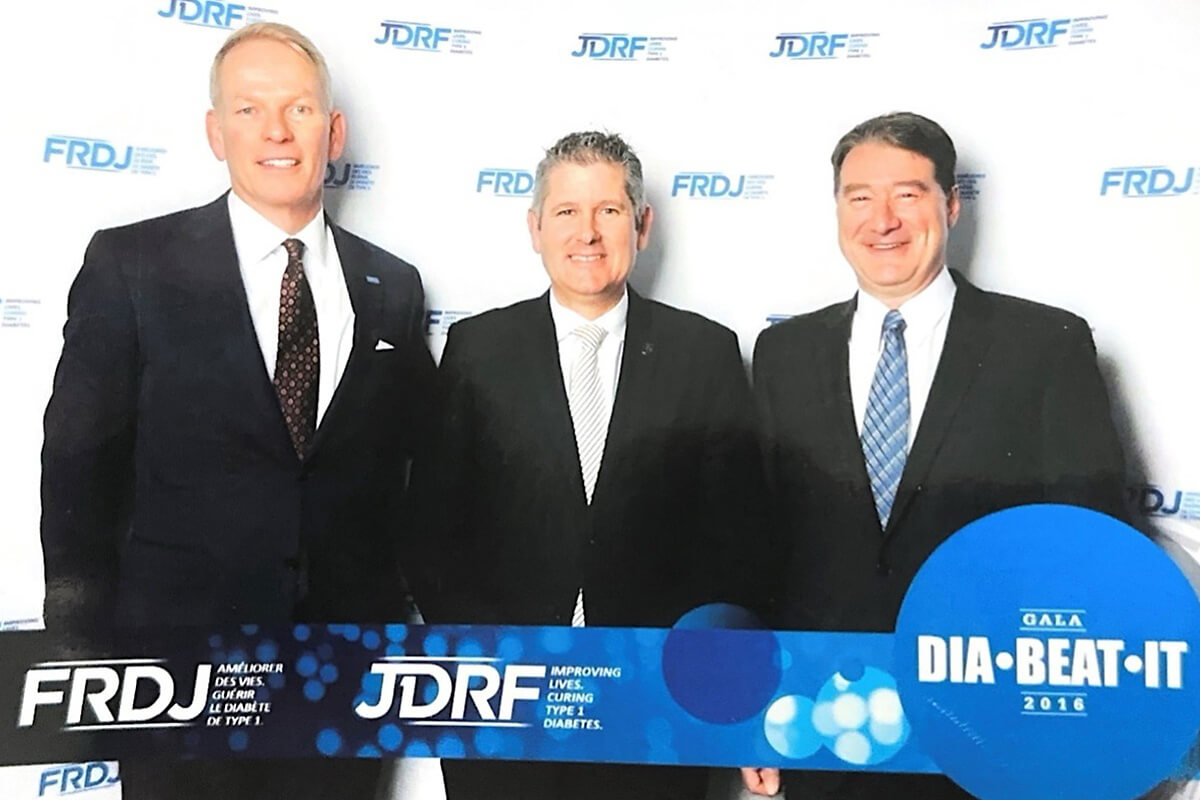Meet Our New International Board of Directors Vice Chair, Matt Varey
in Leadership, Volunteer

L-R: Matt Varey, Martin Thibodeau, Royal Bank of Canada Regional President, British Columbia, and Dave Prowten, former JDRF Canada President and CEO
Matt Varey, the newly elected Vice Chair of the JDRF International Board of Directors (IBOD), brings a global voice as the first Canadian and the first person outside of the U.S. to serve in the role.
Matt, a senior executive at the Royal Bank of Canada (RBC), began volunteering with JDRF Canada in 2001. Since then, he has served on JDRF’s International Board of Directors and as Chair of the Board of JDRF Canada.
He resides with his wife, Dr. Andrea Jack, in Oakville, Ontario, Canada.
JDRF sat down with Matt to learn more about his volunteer journey and unique global perspective.
What led you to start volunteering for JDRF?
In 2001, I returned to Canada from professional commitments abroad and witnessed colleagues and personal friends whose lives were affected by type 1 diabetes (T1D). I couldn’t just stand by and watch; I had to do anything I could to support them—not just on a personal level but also in a broader capacity. At that time, RBC started a coast-to-coast initiative with JDRF Canada, and I recognized I had new ways to make a difference. That started this purposeful journey I have been on with JDRF.
What are some of the roles have you had within the organization?
My first involvement with JDRF was as a rider in the 2001 JDRF Toronto Ride for a Cure. That led to my joining the Toronto Ride cabinet with other business leaders and, later, my becoming Chair of the JDRF Ride.
In 2008, I was appointed a Board Member of JDRF Canada. From 2014 to 2016, I served as the Chair of JDRF Canada. To this date, I remain on the Board of JDRF Canada, having taken on different mandates, including Chair of the Audit and Risk Committee and Chair of the Investment Committee.
Since 2016, I have been a Board member of JDRF International, serving in various capacities, including member of the JDRF International Finance Committee and Chair of the JDRF International Audit and Risk Committee.
Do any of your experiences at JDRF Canada stand out?
Every moment supporting this meaningful mission is special, and one of the highlights was my role as Chair of JDRF Canada from 2014 to 2016. I was directly involved in the purposeful journey of making a difference for over 350,000 Canadians living with T1D, stewarding this cause for JDRF Canada as a Canadian. In 2017, in conjunction with the CHIR (Canadian Health Institute Research) and our incredible team under the leadership of former President and CEO of JDRF Canada Dave Prowten, we secured a 30-million grant from the Government of Canada to support JDRF research and scholastic advancements in Canada.
Do you feel you will offer a unique perspective to IBOD as a person who lives in Canada?
JDRF is a global organization on a journey of purpose. I’m excited and grateful to extend the reach of that journey. Canada is world-renowned for diabetes research and breakthroughs—the first genetically engineered human insulin was discovered and manufactured in Canada, after all! It is the responsibility of all Canadians to carry that flame of innovation and discovery, so I feel even more of an obligation as a Canadian on the JDRF IBOD to carry that baton forward.
Why are volunteers so essential to our mission?
Grassroots volunteering is empowering and essential to the success of all nonprofit organizations. JDRF volunteers keep us close to the cause and the people impacted by the disease—their care, passion, and dedication will help spread our purpose across the globe.
What does the future of T1D look like to you?
We have seen so much progress in recent years, and it will continue at an even faster pace. Cell therapies are an exciting focus area for JDRF. I’m eager to see where that research takes us, particularly eliminating the need for immunosuppressant drugs.
Clinical trials show the possibilities for disease-modifying therapies to preserve beta cell function in people newly diagnosed with T1D. Today, we can delay the onset of T1D, and I’m confident tomorrow, we’ll be able to stop it! Scientists are finding ways to make insulin work smarter and work in conjunction with other drugs for better and safer disease management. There are so many ways JDRF is improving the lives of people with T1D—treatments and therapies will continue to advance until we reach our ultimate goal: cures.
What does the future of JDRF look like to you?
We are purposefully seeking opportunities for JDRF to achieve more breakthrough research and facilitate diabetes education and knowledge globally. As an organization with a global reach, it is our responsibility to enable more access to research, education, and awareness in every corner of the world to help everyone understand the disease, navigate it, and support those impacted by it.